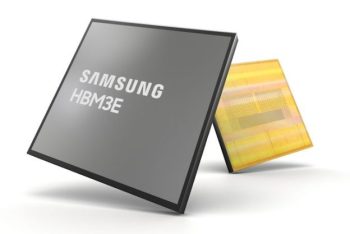
(Reuters) – Samsung Electronics‘ latest high bandwidth memory (HBM) chips have yet to pass NVIDIA’s tests for use in its Artificial Intelligence (AI) processors due to heat and power consumption problems, three people briefed on Samsung’s HBM chips issues said.
The problems affect Samsung’s HBM3 chips, which are the fourth-generation HBM standard currently most used in graphics processing units (GPUs) for AI, as well as fifth-generation HBM3E chips that the South Korean tech giant and its rivals are bringing to market this year, they said.
The reasons for Samsung failing NVIDIA’s tests are being reported for the first time.
Samsung said in a statement to Reuters that HBM is a customised memory product requiring “optimisation processes in tandem with customers’ needs,” adding that it is in the process of optimising its products through close collaboration with customers. It declined to comment on specific customers.
In separate statements after Reuters first published this report, Samsung said that “claims of failing due to heat and power consumption are not true,” and that testing was “proceeding smoothly and as planned.”
NVIDIA declined to comment.
HBM is a type of dynamic random access memory or DRAM standard first produced in 2013 in which chips are vertically stacked to save space and reduce power consumption. It helps process massive amounts of data produced by complex AI applications. As demand for sophisticated GPUs has soared amid the generative AI boom, so has demand for HBM.
Samsung’s HBM Growth Might Depend on Passing NVIDIA’s Tests
Satisfying NVIDIA, which commands around 80% of the global GPU market for AI applications, is seen as key to future growth for HBM manufacturers—both reputationally and in terms of profit momentum.
Samsung has been trying to pass NVIDIA’s tests for HBM3 and HBM3E since last year, the three sources said. According to two of the people, the results of a recent failed test for Samsung’s 8-layer and 12-layer HBM3E chips came in April.
It was not immediately clear if Samsung’s HBM chips problems could be easily addressed, but the three sources said that the failures to meet NVIDIA’s requirements have increased concerns in the industry and among investors that Samsung could fall further behind rivals SK hynix and Micron Technology in HBM.
 (0)
(0) (0)
(0)Archive
- October 2024(44)
- September 2024(94)
- August 2024(100)
- July 2024(99)
- June 2024(126)
- May 2024(155)
- April 2024(123)
- March 2024(112)
- February 2024(109)
- January 2024(95)
- December 2023(56)
- November 2023(86)
- October 2023(97)
- September 2023(89)
- August 2023(101)
- July 2023(104)
- June 2023(113)
- May 2023(103)
- April 2023(93)
- March 2023(129)
- February 2023(77)
- January 2023(91)
- December 2022(90)
- November 2022(125)
- October 2022(117)
- September 2022(137)
- August 2022(119)
- July 2022(99)
- June 2022(128)
- May 2022(112)
- April 2022(108)
- March 2022(121)
- February 2022(93)
- January 2022(110)
- December 2021(92)
- November 2021(107)
- October 2021(101)
- September 2021(81)
- August 2021(74)
- July 2021(78)
- June 2021(92)
- May 2021(67)
- April 2021(79)
- March 2021(79)
- February 2021(58)
- January 2021(55)
- December 2020(56)
- November 2020(59)
- October 2020(78)
- September 2020(72)
- August 2020(64)
- July 2020(71)
- June 2020(74)
- May 2020(50)
- April 2020(71)
- March 2020(71)
- February 2020(58)
- January 2020(62)
- December 2019(57)
- November 2019(64)
- October 2019(25)
- September 2019(24)
- August 2019(14)
- July 2019(23)
- June 2019(54)
- May 2019(82)
- April 2019(76)
- March 2019(71)
- February 2019(67)
- January 2019(75)
- December 2018(44)
- November 2018(47)
- October 2018(74)
- September 2018(54)
- August 2018(61)
- July 2018(72)
- June 2018(62)
- May 2018(62)
- April 2018(73)
- March 2018(76)
- February 2018(8)
- January 2018(7)
- December 2017(6)
- November 2017(8)
- October 2017(3)
- September 2017(4)
- August 2017(4)
- July 2017(2)
- June 2017(5)
- May 2017(6)
- April 2017(11)
- March 2017(8)
- February 2017(16)
- January 2017(10)
- December 2016(12)
- November 2016(20)
- October 2016(7)
- September 2016(102)
- August 2016(168)
- July 2016(141)
- June 2016(149)
- May 2016(117)
- April 2016(59)
- March 2016(85)
- February 2016(153)
- December 2015(150)
